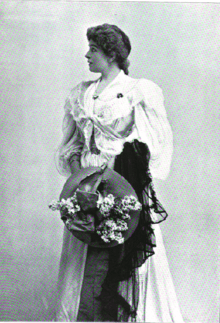Mrs. Leslie Carter
| Mrs. Leslie Carter | |
|---|---|
|
Carter as Mme. Du Barry on the October 1902 cover of The Theatre | |
| Born |
Caroline Louise Dudley June 10, 1857 Lexington, Kentucky, US |
| Died |
November 13, 1937 (aged 80) Santa Monica, California, US |
| Spouse(s) |
Leslie Carter (May 26, 1880 - May 22, 1889) Louis Payne (July 13, 1906 - November 13, 1937) |
Caroline Louise Dudley (June 10, 1857[1] – November 13, 1937) was an American silent film and stage actress who used her married name, Mrs. Leslie Carter, as her stage name to spite her former husband. She was called "The American Sarah Bernhardt".
Early life
Caroline Dudley was born in Lexington, Kentucky. The exact date is not known but research points to the year 1857.[2] Her father was Orson Dudley, a wholesale dry goods merchant of means, who gave to his daughter every advantage that money could bestow. Her mother was Catherine Dudley. Most of her childhood was spent in Dayton, Ohio. She aspired to the stage from childhood, but for family reasons she never appeared publicly, even at amateur entertainments.
At the time of her 1880 marriage in Dayton to lawyer Leslie Carter, a Chicago millionaire, she was considered a great belle, as she was a strikingly beautiful girl with great vivacity. They had one child, a son, Dudley Carter. In 1887 she filed for divorce on the grounds of physical assault and abandonment, but in 1889, Mr. Carter obtained the divorce naming actor, H. Kyrle Bellew, as co-respondent. Son Dudley chose to live with his mother and was cut out of his father's will as a result. Press coverage of the trial was suppressed, but the filing and results were front page scandal.
Career
Her association with Broadway impresario, David Belasco, skyrocketed her to theatrical fame. Her first hit was as the lead character in The Heart of Maryland (1895), a huge hit that was followed by the even more sensational Zaza (1898) and Madame Du Barry (1901). In The Heart of Maryland, she wore a wig with six-foot tresses. Her great scene came as the heroine swinging in the belfry tower, her hands gripping the clapper to prevent the ringing of a huge curfew bell. The sensational swinging out of Mrs. Carter thirty-five feet above the stage with off-stage fans sending her long tresses streaming set New York audiences cheering.

Carter became her generation's greatest dramatic actress. When she broke with Belasco in 1906 after her surprise remarriage, she was already considered a relic and abandoned Broadway in favor of vaudeville. In July 1906, she married actor (William) Louis Payne (1875 – August 17, 1955) who was often her leading man on stage, and later managed her business affairs. They adopted a daughter, Mary Carter Payne.

In 1915, pioneer producer George Kleine hired her to recreate Madame Du Barry for the motion picture cameras. She was already in her fifties and too old for the part, but it was nevertheless followed by a screen version of her first success, the civil war melodrama The Heart of Maryland. Neither film was a success. Her last stage hit was as a decayed coquette, in Somerset Maugham's drawing-room comedy, The Circle, in 1921.
Returning to vaudeville, Carter's career collapsed in 1926 when she was fired during a Newark, New Jersey, tryout of The Shanghai Gesture, in which she had been cast as Mother Goddam. As she owned a half-interest in the show, which went on to be a Broadway success, she received half the royalties. She appeared in the road version of the show after its New York run.
Later years
She retired to California but returned to the screen twice in 1935, first as George F. Marion's wife in the Zane Grey western The Rocky Mountain Mystery (aka The Fighting Westerner) starring Randolph Scott and also playing a small role in the Technicolor film Becky Sharp, starring Miriam Hopkins.
She died in 1937 at Santa Monica, California of heart disease. She is buried in Woodland Cemetery, Dayton, Ohio in the family plot with her second husband, her son Dudley, and several other Dudley and Payne family members.
Carter's ascendancy in the theatrical world was fictionalized and sensationalized, in The Lady With Red Hair (1940). Kay Francis and Bette Davis in turn had been slated for the role, but it was Miriam Hopkins who portrayed her. Claude Rains portrayed David Belasco. Second husband Louis Payne was a technical adviser on the film. Louis Payne died in 1955 at the Motion Picture Country Home.
Ghost
Apparently after her death she stayed around the Theater Republic, where she got her start. Now The New Victory Theater, staff and visiting companies say they are visited by the ghost of Mrs. Leslie Carter when trouble arises backstage.[3]
Filmography
- The Scales of Justice (1914)
- DuBarry (1915)
- The Heart of Maryland (1915)
- The Lifeguardsman (1916)
- Rocky Mountain Mystery (1935)
- Becky Sharp (Uncredited, 1935)
References
- ↑ Mrs. Leslie Carter, A Biography of the Early Twentieth Century American Stage Star by Craig Clinton, c. 2006; McFarland Publishing
- ↑ Mrs. Leslie Carter: A Biography of the Early Twentieth Century American Stage Star by Craig Clinton c.2006 McFarland Publishing Co. pages 9-10
- ↑ http://newvictorytheater.blogspot.com/2010/10/spooky-ghosts-in-new-vic.html
- Bibliography
- "Sued for Divorce; Wealthy Lawyer Carter's Wife Makes Serious Allegations." New York Times, Nov 19, 1887. page 2
- "A Revolting Case Disposed of." New York Times, May 23, 1889. page 1
- "Mrs. Leslie Carter Dies In California", The New York Times, November 14, 1937, page 53.
External links
- Mrs. Leslie Carter at the Internet Movie Database
- Mrs. Leslie Carter at the Internet Broadway Database
- Mrs. Leslie Carter at Find a Grave
- Mrs Carter photo gallery NYP Library
- Mrs. Carter portrait gallery University of Washington, Sayre collection
- 1919 passport photo